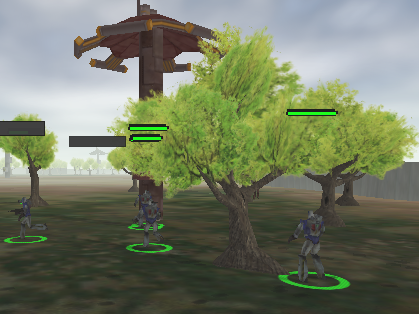
As part of the College of Natural Sciences Freshman Research Initiative (FRI) program, the Department of Computer Sciences and the Neural Networks Research Group are offering a two-semester course sequence for freshmen and sophomores interested in the fields of Artificial/Computational Intelligence, Machine Learning and their applications to video game technology. The course sequence is centered around the successful NERO machine learning game designed and built at UT by graduate and undergraduate students. Currently this project continues as part of the more general and ambitious OpenNERO platform for AI research and education.
The goal of the sequence is to work on and complete an independent or team research project in artificial intelligence, game technology or related fields of computer science. Students work in a research group-like setting, with meetings initially taking form of lecture and progressing to paper discussions and student presentations. Students also have individual meetings with the instructors and have access to specialized hardware and software in the stream lab.
Previous course home page (subject to change): www.cs.utexas.edu/~risto/cs378i.
The first part of the course is organized as lecture with homeworks to ensure that students have the necessary background to come up with a research topic. Toward the end of the semester, students start working with topics which are currently subject of active research and come up with a project proposal for the summer and/or fall semester. Topics discussed include:
Previous course home page (subject to change): www.cs.utexas.edu/~risto/cs378ii.
In the second part of the course sequence, students complete the research project starting from their proposal from the first semester. Students attend group meetings, present their research progress, and meet individually with the instructors and mentors. The course results in a project report and we encourage students to continue working on their research leading to a publication or an honors thesis throughout their undergraduate career.
Past and current res arch projects by the undergraduate students include implementations of new artificial intelligence algorithms in a gaming environment, improvements to existing algorithms, natural language understanding and generation, evolution of communication, competitive co-evolution, evolution of morphology, modeling human behavior in games, and others.